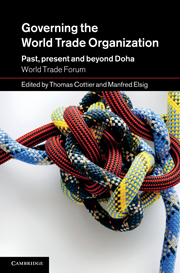Book contents
- Frontmatter
- Contents
- List of figures
- List of tables
- Notes on Contributors
- Preface
- List of abbreviations
- 1 Introduction
- PART I Setting the stage
- PART II Boundaries
- PART III Emerging and established powers
- PART IV Weaker actors
- PART V The consensus principle
- PART VI Quo vadis?
- 12 A post-Montesquieu analysis of the WTO
- 13 Reforming the WTO: the decision-making triangle revisited
- 14 Barriers to WTO reform: intellectual narrowness and the production of path-dependent thinking
- Index
- References
13 - Reforming the WTO: the decision-making triangle revisited
Published online by Cambridge University Press: 07 September 2011
- Frontmatter
- Contents
- List of figures
- List of tables
- Notes on Contributors
- Preface
- List of abbreviations
- 1 Introduction
- PART I Setting the stage
- PART II Boundaries
- PART III Emerging and established powers
- PART IV Weaker actors
- PART V The consensus principle
- PART VI Quo vadis?
- 12 A post-Montesquieu analysis of the WTO
- 13 Reforming the WTO: the decision-making triangle revisited
- 14 Barriers to WTO reform: intellectual narrowness and the production of path-dependent thinking
- Index
- References
Summary
Introduction
Are international organisations (IOs) back in vogue? While most IOs were treated badly for most of the cold war period, they have recently attracted more attention, raising expectations in many policy areas in international law and global politics. Some organisations, in particular the World Trade Organization (WTO) clearly moved centre stage during the Uruguay Round (1986–94). Ever since then, increasing pressures emanating from globalisation processes have steadily improved the prospects for IOs to be chosen to manage and coordinate emerging challenges. Growing needs to address global concerns call for enhanced cooperation, if not advanced integration of policy areas at the international level. The existing constitutional framework of IOs, essentially shaped after the Second World War, for want of a better alternative, has to serve as the backbone for taking additional steps in identifying and shaping public goods, rights and obligations of states and private actors. In the wake of financial crises, the challenges of ongoing climate change and new pandemic threats, calls for delegating more tasks to IOs have intensified. Yet most of the unfolding potential is far from being utilised. International cooperation still hinges on the reluctance of key actors to delegate sufficient authority to the supranational level and to address appropriate structures and processes of decision-making commensurate with the tasks ahead. Traditional perceptions of sovereignty of the nation state loom large.
- Type
- Chapter
- Information
- Governing the World Trade OrganizationPast, Present and Beyond Doha, pp. 289 - 312Publisher: Cambridge University PressPrint publication year: 2011
References
- 5
- Cited by



